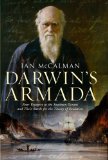Summary | Excerpt | Reviews | Beyond the Book | Readalikes | Genres & Themes | Author Bio

Critics' Opinion:
Readers' Opinion:
First Published:
Aug 2009, 432 pages
Paperback:
Nov 2010, 432 pages
 Book Reviewed by:
Book Reviewed by:
Kim Kovacs
Buy This Book
Darwin had been linked to the bucolic father of naturalism, Reverend Gilbert White, whose minute and loving journal of the daily activities and interdependencies of the plants and animals of the village of Selborne was a classic. Darwin had made a pilgrimage with his son Francis to White's house and garden in Surrey, and had begun but never completed 'An Account of Downe', which Francis thought was intended to be a natural history diary in the style of White's.
Like Gilbert White, Darwin had walked every inch of the fields, meadows and birch woods surrounding his home, often several times a day, observing insects, birds and plants with an eye made keen by years of trained observation. Though nobody understood better than he the savagery of nature, nobody better appreciated the 'peace and silence' of the hamlet that visitors so often remarked upon. He'd recognised that Down House, though only fifteen miles to the south-east of London, was not unlike a remote island in the Pacific, 'absolutely on the verge of the world'. This made it an ideal natural laboratory for testing his ceaseless flow of ideas. His final book, on earthworms, had not only been inspired by a passage in White's Natural History of Selborne, but had also resulted from his work on the soil and moulds in his own garden.
In the end, despite agreeing to the Abbey funeral, Emma decided not to attend. Privately she admitted that 'it gave us all a pang not to have him rest quietly by [his brother] Eras', and she preferred to stay at the house, which was cluttered with Darwin's objects and suffused by his presence. A visiting journalist had felt the same sensation as he looked at the shawls, cloaks and cushions still sprawled on Darwin's 'ungainly' chair in front of the fire, at the books, papers, glass shades and card boxes scattered on his table, and at the two plants on a low bench that he'd been studying just before he died.
The boys and their wives went to Westminster Abbey, where William showed that he'd inherited not only his father's propensity to baldness, but also his hypochondria. Feeling a breeze blowing through the Abbey and fearing a chill, William sat throughout the ceremony with his gloves perched on his head. Reverend Farrar later told William that the magnitude of the public tribute had 'over-shadowed private feeling'. Neither did the family entirely escape the controversy that Emma had feared. Lady Hope, an aptly named evangelical who'd preached at Downe towards the end of Darwin's life, began a rumour that he'd rejected evolution on his deathbed and declared himself a Christian. It was nonsense of course Darwin's last words had actually been 'I am not in the least afraid to die' but the resultant newspaper fuss distressed Emma and the children.
Deep down, those three scientists who had helped carry Darwin's coffin probably agreed with his wife; each would have preferred a more intimate local burial for the man they had worked with and loved. But they also saw that his funeral was the last and perhaps greatest symbolic battle in a war they'd been fighting for twenty years. They had waged a fierce, unremitting campaign in defence of Darwin's theory of evolution by natural selection, against a host of scientists, philosophers, clergymen, politicians and others who found its irreligious implications unacceptable. They had fought, too, for the kind of observational, fact-gathering and law-making mode of science that Darwin pioneered.
Thomas Huxley, biologist, palaeontologist and social philosopher, had been tireless in taking Darwin's ideas to the public, and in extending the implications of evolution to other spheres of science and culture. In private he mourned Darwin as intensely as anyone: he felt 'a poignant grief to think I shall never hear his cheery welcome or feel his cordial grasp again'. Speaking in public, though, Huxley still used the language of war. He extolled Darwin as a hero and a fighter who 'led us to victory. He found a great truth, trodden underfoot, reviled by bigots, and ridiculed by all the world; he lived long enough to see it, chiefly by his own efforts, irrefragably established in science, inseparably incorporated within the common thoughts of men.'
Reprinted from Darwin's Armada: Four Voyages and the Battle for the Theory of Evolution by Iain McCalum copyright (c) 2009 by Iain McCalum. with permission of the publisher, W.W. Norton & Company, Inc.





The House on Biscayne Bay
by Chanel Cleeton
As death stalks a gothic mansion in Miami, the lives of two women intertwine as the past and present collide.

The Flower Sisters
by Michelle Collins Anderson
From the new Fannie Flagg of the Ozarks, a richly-woven story of family, forgiveness, and reinvention.

The Funeral Cryer by Wenyan Lu
Debut novelist Wenyan Lu brings us this witty yet profound story about one woman's midlife reawakening in contemporary rural China.
Your guide toexceptional books
BookBrowse seeks out and recommends the best in contemporary fiction and nonfiction—books that not only engage and entertain but also deepen our understanding of ourselves and the world around us.